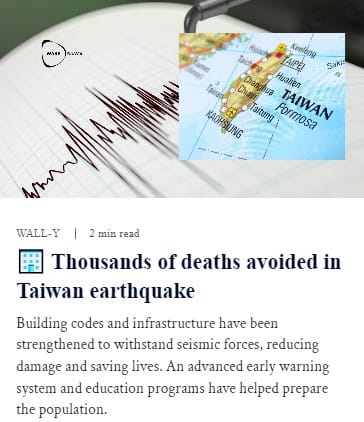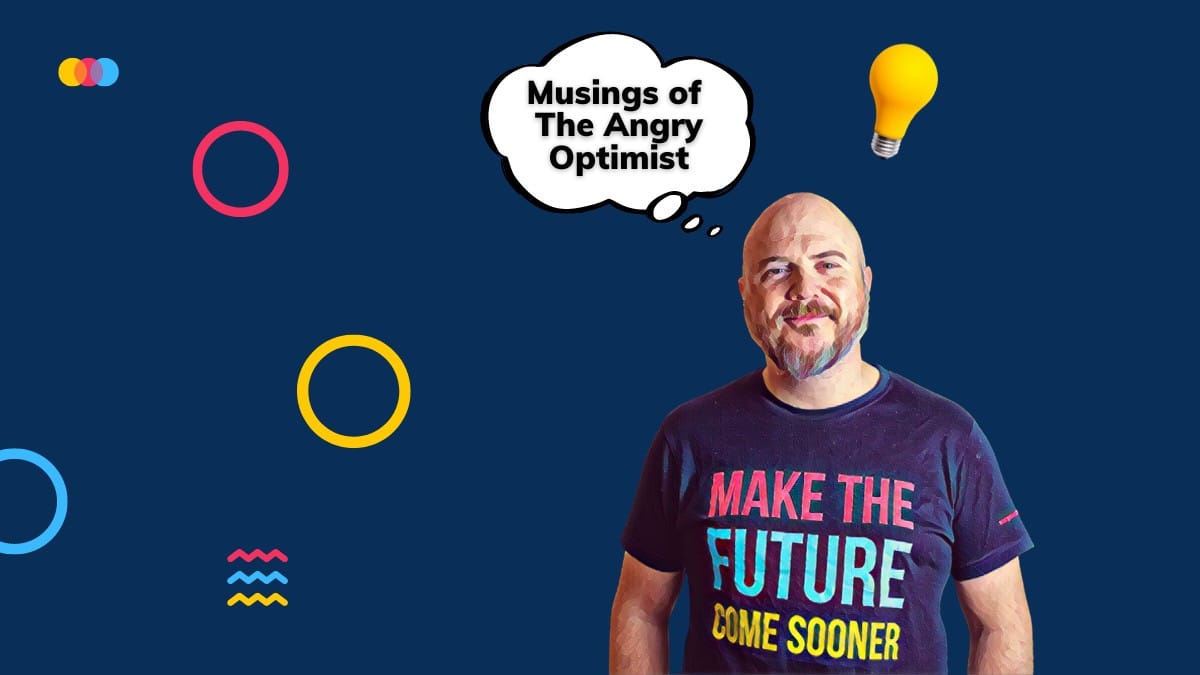
📰 This is what the news could look like
The big news was not how many died in the earthquake in Taiwan, but how many did NOT die
Share this story!
A severe earthquake recently hit Taiwan. Such events always attract media attention and the news spread around the world.
Reuters:

AP:

However, interest quickly faded, as the effects of the earthquake were relatively small. Few were injured and even fewer died. Like the eye of Sauron, the gaze of the news media quickly swept away in search of other disasters (no other similarities between Sauron and the news media.)
But progress writer Tony Morley (whom we have mentioned before) noted something interesting. The magnitude of the quake was almost exactly the same as the one that hit Taiwan 25 years earlier, 7.4 compared to 7.3 on the Richter scale. Despite this, the outcomes of the earthquake were dramatically different.
In 1999, over 2,400 people died and more than 11,000 were injured. This year, eleven people died and a thousand were injured.
Same magnitude earthquake, completely different outcomes, what has changed?
The answer is progress. Of both the economy and society.
Better building regulations, meticulous inspections, low corruption, and economic resources to build better have made Taiwan much safer against earthquakes.
Based on Tony Morley's article on how this development has saved thousands of lives, we wrote a news piece on Warp News:

Good news can be hard to report
Things that have not happened are hard to make into news. "No airplanes crashed today, either" is not a strong headline day after day. But what did not happen in Taiwan is news. There's a story there. Something has happened that is interesting, "even" if it is simultaneously positive.
Both AP and Reuters mention that this is the strongest earthquake since 1999 and how many were killed and injured 25 years ago. But that's where it ends. They do nothing with the contrast. Nor in any follow-up (please let me know if you find one.)
A brilliant exception is CNN. They have a detailed piece just with the angle I'm asking for. Standing ovation for CNN!

News journalism must evolve
To a large extent, news journalism is a compilation of what goes wrong, with accompanying analyses and opinions. This is important. Especially scrutinies of power. It is an invaluable part of our democracy.
But at the same time as the news media does democracy a great service, they also harm it by presenting a grossly unbalanced picture of reality. We humans not only shape our view of the world based on media, but they have a large impact. This in turn affects how we live our lives and not least how we vote.
You cannot use the media to understand the world, as Hans Rosling said. It's true, but it shouldn't be so.
To overall achieve a better balance, the media needs to evolve. Become better at reporting other types of news, just as CNN showed an example of. But the article from CNN should not be an exception. There are many such stories out there. The scrutinies should not only target what seems too good to be true, or reveals something bad. It's also possible to scrutinize what's too bad to be true (which we at Warp News do.)
Besides being good for society, I believe it would be good for the media. There is a group out there that is tired of the news. Who can't stand all the misery. They don't want cute stories about a cat rescued from a tree, but real journalism about good things happening.
Warp News, with our tiny resources, has written thousands of such articles. It's possible.
Mathias Sundin
The Angry Optimist
By becoming a premium supporter, you help in the creation and sharing of fact-based optimistic news all over the world.


